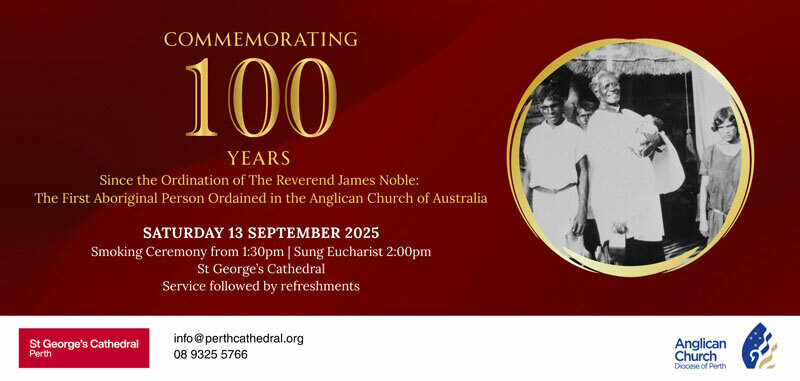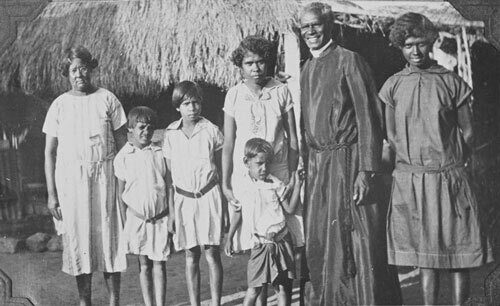100th Anniversary of the
Ordination of The Revd James Noble
Carolyn Tan, Convenor of the Diocesan Aboriginal Ministry Policy Group
The Revd James Noble was the first Aboriginal person ordained in the Anglican Church in Australia. He was ordained deacon at St George’s Cathedral on 13 September 1925.
There will be a service at 2.00pm on Saturday 13 September at the Cathedral to celebrate the centenary of his ordination, and to pray for the flourishing of Aboriginal ministry in this land we now call Australia. A smoking ceremony will be held from about 1.30pm and the service will involve input from Noongar elders as well as the Boojar Bidi dance group from Guildford Grammar School. The Primate and representatives of the Anglican Board of Mission are coming to Perth for the service. You are invited, as we would love to see the Cathedral packed for this important occasion.

Who was James Noble?
James Noble was born in western Queensland near Normanton in around 1876. He worked as a stockman, driving stock between Queensland and Scone in New South Wales. In Scone, his employers, the Doyles, brought him to Sunday School. Here he came to faith. He was baptised on 1 July 1895 and confirmed a week later.
The climate of New South Wales affected his health, and James was sent to north Queensland. The Bishop there asked the Revd Ernest Gribble to give him a home at the Yarrabah Mission near Cairns. James developed preaching and teaching gifts, which reinforced his passion to be a missionary to his people.
At Yarrabah he met Angelina, a Badtjala woman, who had been abducted by a horse dealer and finally freed by the police who arranged for her to live at Yarrabah for her safety. It was Angelina who had the skills to learn native languages and cultures, and who gained the trust of the local people that she and James would minister to. As the only woman in a missionary team, Angelina also acted as nurse, teacher, housekeeper and administrator in those missions.
When Ernest Gribble was called to set up various missions, he brought James and Angelina with him. They founded missions at Mitchell River (Kowanyama) in Queensland and Roper River (Ngukurr) in the Northern Territory before moving to the Forrest River Mission (Oombulgurri) in the northwest of
Western Australia in 1914.
James went on a preaching tour around Australia and returned to the West through Perth, where he was ordained as a deacon by Bishop Gerard Trower of the Diocese of the North-West. His ordination was extensively reported in the media. Ernest Gribble wrote:
‘Three days after his ordination, I accompanied him to the steamer in Fremantle to return to his work at Forrest River. As we stepped onto the wharf, the lumpers were at their lunch. As we passed a group, one said, ‘You, chaps, here is the black parson,’ and all of those men and many nearby came up and shook hands with James. One, clapping him on the back, said, ‘Well done, Noble, old man; good luck to you.’ A week or so after the steamer had gone, I met a lady in Fremantle who told me that she had seen a letter written by a steward on the steamer to his wife and sent down by aerial mail, in which he stated that they had the black parson on board and that on the Sunday he had held service in the saloon and preached ‘a dinkum sermon’.’
The Nobles played a significant role in the aftermath of the Forrest River massacres. In 1926, a confrontation occurred between Hay, one of the owners of Nulla Nulla station, and an Aboriginal man, Lumbia, who believed Hay had raped and sought to abduct his wife. Lumbia was flogged, and he retaliated by spearing Hay to death. In retribution, some police officers went on an indiscriminate killing spree of Aboriginal people. When these massacres were reported, Noble, with his excellent skills as a tracker, discovered places where Aboriginal prisoners were shot and their bodies burnt. Gribble campaigned for official investigations and, finally, in 1927, a Royal Commission was held. It found that at the three locations to which the Commission limited its investigations, at least 11 Aboriginal people had been killed. The Commissioner said that he found James Noble’s evidence to be thoroughly convincing and absolutely reliable. Angelina acted as an official interpreter for Aboriginal witnesses, during the investigations and before the Royal Commission. However, Gribble was shunned and sacked in 1928, and moved back to Queensland.
In 1932 James and Angelina also left Forrest River and returned to Yarrabah but, due to failing health and injury from a bad fall, James died on 25 November 1941, and that is the date in which he is remembered in the Anglican Church calendar. Angelina continued to work in Yarrabah until her death in 1964.
Questions
The way Christian missions were run, and the attitudes held in those days, were often not something that we would condone today. There have been debates and controversies over the paternalistic and controlling way that Ernest Gribble ran the missions. There may be questions about whether the Nobles acquiesced in this, or whether they could have done anything to prevent it. There will always be a need for truth-telling and repentance when the Church has done harm. At the same time, James Noble clearly believed that the missions were a way of protecting and providing for the local Aboriginal people who were driven off their lands. He was passionate about spreading the gospel to them. The Nobles have been an inspiration to other Aboriginal ministers who have followed them, and they are looked on with fondness and respect by many from the missions they helped to build.
These concerns were discussed with local Aboriginal elders in Perth, who felt that, despite the failings of the missions, that James Noble was someone to be acknowledged as a dedicated leader and trail-blazer. As one elder commented, James Noble was a great man, but not because of his ordination, as he was already a leader of dignity and respect.
Although the ordination and ministry of The Revd James Noble is something to be celebrated, it is also a point to lament that, so far, The Revd James Noble is the only Aboriginal person to have been ordained in our Diocese. Of course, his ministry started long before his ordination; and we can also celebrate the wonderful ministry of Angelina Noble. We can also be grateful for the ministry of Aboriginal people here in so many different ways, before and after the Nobles. These have been ministries of grace, despite what Church institutions and settler societies have done to dispossess Aboriginal people of their lands and cultures.
This service commemorating James Noble’s ordination can be an opportunity for all of us to make a commitment to encourage, to facilitate and give thanks for the diverse ministries of Aboriginal people, lay and ordained.
